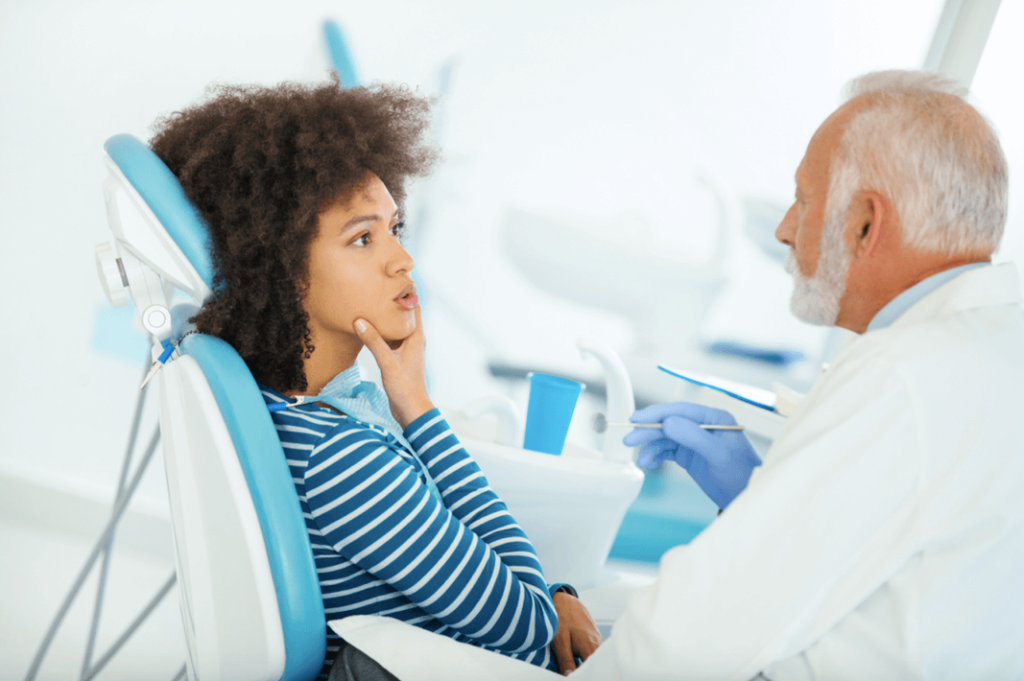Do You Grind Your Teeth at Night?
Do you catch yourself grinding your teeth in stressful situations? Millions of people are affected by bruxism, also known as teeth grinding. Patients with bruxism regularly grind or clench their teeth. Most people grind their teeth at night while they sleep. As a result, you may not realize that you have a dental problem. Instead, you may notice that you have frequent headaches, sore jaw pain, receding gums, and worn teeth.
Dr. Morgan Chambers practices “complete dentistry” and seeks to identify the underlying cause of teeth grinding for a more comfortable, permanent solution. Teeth grinding can damage both your teeth and gums. It can eventually lead to tooth loss as well! Learn more about this common issue and the teeth grinding treatment options that we offer at Complete Dentistry For All Ages.

What is Bruxism?
Bruxism is a disorder which involves the forceful clenching, grinding and gnashing of teeth. It usually occurs during sleep, but it can also occur during waking hours. This condition affects millions of people around the world and can cause serious damage to the teeth and jaw if left untreated. One major cause of bruxism is an injury to the lower jaw or face. Injuries may result from sports injuries, falls or trauma.
Treatment options for bruxism include medications, lifestyle changes, or mouthguards to prevent further damage to the teeth and jaw. There are several common symptoms that accompany bruxism:
- Worn teeth
- Tooth Sensitivity
- Difficulty sleeping
- Dull or abraded tooth enamel
- Jaw pain or soreness
- Broken fillings and/or crowns
- Frequent morning headaches
- Chipped teeth
Teeth Grinding Treatment in Lexington, KY
Dr. Chambers will perform a thorough exam to evaluate a patient’s bite and determine the cause of teeth grinding. As with treating a temporomandibular disorder, restoring balance to the bite will provide lasting results and help support long-term oral health. There is no definitive treatment for bruxism, but we strive to lessen the effects. Dr. Chambers may recommend an oral appliance that you will wear only during sleep to protect your teeth from grinding and clenching.
- Mouthguard or Dental Splint. An oral appliance such as a mouthguard or dental splint can reduce stress on the jaw joint and relieve symptoms. These are removable appliances, best suited for patients with a balanced bite and healthy temporomandibular joint (TMJ).
- Bite Equilibration Therapy. Bite correction therapy addresses tooth damage and misalignment that is affecting the balance of your bite. It involves your dentist making minor adjustments to teeth to allow them to fit together properly, eliminating stress and pressure.
- Invisalign Clear Aligners. Using Invisalign clear aligners to move your teeth into proper alignment can help correct a bad bite. Invisalign uses a series of clear aligners to move your teeth orthodontically into a better position without wires and braces. Patients can receive a healthy bite and beautiful smile at the same time.
Video Testimonial
Treatment Options for the Effects of Teeth Grinding
Once we’ve successfully helped you stop tooth grinding, the next step is to address the effects teeth grinding has left behind. The aftermath can have a detrimental effect on your mouth. You should address your worn teeth, cracked teeth, and bleeding gums issues as soon as possible to prevent infections and tooth loss.
Dr. Chambers can provide the best restorative dentistry procedures, or a total smile makeover, to bring teeth back to optimal health and esthetics. Tooth crowns are great for patients that have severely worn-down teeth. Crowns cover the top and sides of the affected tooth. This creates a new protective layer that is not noticeable.
A dental crown is a permanent restoration. If you have worn down front teeth or teeth in the smile zone, we may recommend porcelain veneers to restore your smile. Veneers are wafer-like shells we place on teeth. They will add new material to your worn teeth, reshaping them into what your teeth might have looked like before teeth grinding. Your dentist also color-matches your new veneers to match your existing teeth.
Teeth Grinding FAQs
Learn more about teeth grinding here:
What is the main reason patients grind their teeth?
Most patients who grind their teeth are unaware that they do. This is because teeth grinding has a high correlation to stress. Your body grinds its teeth to involuntarily release stress. Teeth grinding is a habit that is hard to break. The best way to break the habit is to identify stressors in your life and find ways to deal with or eliminate them. People may also grind their teeth due to depression, consuming excessive caffeine, or tobacco use.
Why is teeth grinding harmful to my health?
Grinding one’s teeth is harmful to patients’ oral and overall health. It can affect your teeth, enamel, gums, and jaw. It can also have a negative effect on the ability to speak and eat normally.
How can I tell if I have been grinding my teeth at night?
Some of the signs of teeth grinding at night are migraines, muscular pain and tightness, and insomnia. Migraines typically occur in the morning, right after patients wake up. Muscle tightness and pain are common in the jaw and shoulders. If you have TMJ it may be due to teeth grinding. If you notice worn down or chipped surfaces on your teeth, schedule an appointment with your dentist to get checked for any problems.
Can a vitamin deficiency be the cause of teeth grinding?
Being deficient in some vitamins can cause teeth grinding in patients. A magnesium deficiency is the most common vitamin that causes teeth grinding and jaw clenching. Low levels of vitamin D and C also has links to sleep disorders and teeth grinding at night. One of the best ways to prevent teeth grinding is by taking a magnesium supplement. Magnesium supplements are available in pill form and liquid form, so it should be easy to find one that suits your needs best.
Can teeth recover from grinding?
Teeth grinding causes damage to the surface and enamel of teeth. It can also lead to your bite becoming misaligned due to pressure from clenching and grinding. You can not reverse damage from grinding, however we can repair the tooth or teeth using restorative dental services. Patients may also wear a mouthguard at night to protect their teeth from further damage.
Schedule a Dental Exam & Consultation Today
Dr. Chambers is an experienced dentist in Lexington, KY, at Complete Dentistry For All Ages. We perform many teeth restorations after addressing bruxism for our patients. Give us a call at 859-251-3809 or schedule a dental appointment online today.
